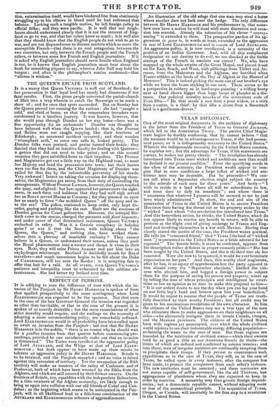TEXAN DIPLOMACY.
ONE of the most original documents in the archives of diplomacy is the letter from the President of Texas to General JACKSON, which led to the Annexation Treaty. The patriot Chief Magis- trate begins by frankly confessing, that he cannot believe " that the measure would be as advantageous to Texas, if she had perma- nent peace, as it is indispensably necessary to the United States." Wherein the indispensable necessity for the United States consists, he explains not ; but the advantage for Texas, if his statements are correct, he makes out pretty clearly. "The revolution has already introduced into Texas more wicked and ambitious men than could be desired in our present condition." From the qualifying words in the close of the sentence, the President would appear to ima- gine that in some conditions a large influx of wicked and am- bitious men may be desirable. But he proceeds—" We can- not tell when a September election might subject the country to the misrule of such men for three years." And lastly—" I wish to reside in a land where all will be subordinate to law, and none dare to defy its mandates "; and where there is " assurance that whatever I possess will be secured to me by just laws wisely administered." In short, the end and aim of the annexation of Texas to the United States is to secure President HOUSTON from having his throat cut or his property stolen by the " wicked " men whom "the revolution has introduced into Texas." And this benevolent action, he thinks, the United States, which do not appear likely to receive any benefit in return, will be able to perform at the slight cost of giving umbrage to France and Eng- land and involving themselves in a war with Mexico. Having thus clearly stated the merits of the case, the President waxes poetical. He tells his "venerated friend," that "Texas [theland of" wicked men "] is presented to the United States as a bride adorned for her espousal." The bonnie bride, it must be confessed, appears from his description rather deficient in proper womanly pride—" She has been sought by the United States, and this is the third time she has consented. Were she now to be spurned, it would for ever terminate expectation on her part." And then, this worthy chief magistrate, after he has, in an agony of apprehension lest the party opposed to him should carry the "September elections," libelled the citi- zens who elected him, and begged a foreign power to subject them for the purpose of saving his person and property, winds up by telling the man of whose principles and intelligence he enter- tains so low an opinion as to dare to make this proposal to him- " It is our ardent desire to see the day when you can lay your hand on our little boy's head and bestow upon him your benediction." It would be unjust to assume that the people of Texas are truth- fully described by their worthy President; but all credit may be given to his unconscious revelations of his own character. In him the citizens of the United States may see a true type of the men who stimulate them to make aggressions on their neighbours on all sides—who alternately instigate them to invade Canada, Oregon, and the Mexican provinces. The citizens of the United States have wide regions yet unoccupied, over which the whole civilized world rejoices to see their indomitable energy diffusing population—. reclaiming the waste to the uses of man. But those regions are bounded by the territories of civilized states—which their owners hold by as good a title as our American friends do theirs—the limits of which are defined and confirmed by solemn treaties ; and into these, men of irregular ambition are continually tempting them to precipitate their troops. If they persist to countenance such expeditions as in the case of Texas, they will, as in the case of Texas, be called upon in every instance, after the conquest has been made, to protect the conquerors from each other's violence. The new territories must be annexed ; and these territories are not states capable of self-government, like the old Thirteen, but aggregations of plunderers whom they are expected to keep in order by coercion. A monarchy may thus govern foreign depend- encies; but a democratic republic cannot, without adopting more or less of the monarchical principle. The acquisition of Texas, Oregon, or Canada, will inevitably be the first step to a revolution in the United States.


























 Previous page
Previous page